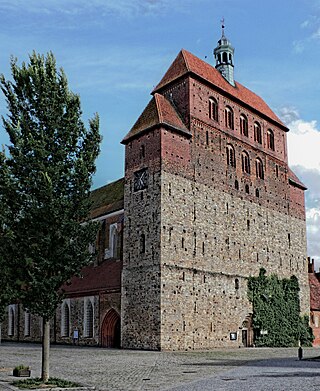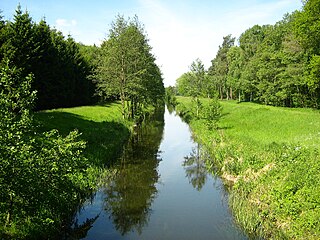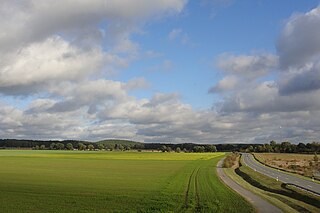
The Havel is a river in northeastern Germany, flowing through the states of Mecklenburg-Vorpommern, Brandenburg, Berlin and Saxony-Anhalt. The 325 kilometres (202 mi) long Havel is a right tributary of the Elbe. However, the direct distance from its source to its mouth is only 94 kilometres (58 mi). For much of its length, the Havel is navigable; it provides an important link in the waterway connections between the east and west of Germany, as well as beyond.

The Spree is a river in Germany and the Czech Republic. With a length of approximately 400 kilometres (250 mi), it is the main tributary of the Havel River. The Spree is much longer than the Havel, which it flows into at Berlin-Spandau; the Havel then flows into the Elbe at Havelberg. The river rises in the Lusatian Highlands, in the Lusatian part of Saxony, where it has three sources: the historical one called Spreeborn in the village of Spreedorf, the water-richest one in Neugersdorf, and the highest elevated one in Eibau. The Spree then flows northwards through Upper and Lower Lusatia, where it crosses the border between Saxony and Brandenburg. After passing through Cottbus, it forms the Spree Forest, a large inland delta and biosphere reserve. It then flows through Lake Schwielochsee before entering Berlin, as Müggelspree(pronounced[ˈmʏɡl̩ˌʃpʁeː] ).
Prignitz is a Kreis (district) in northwestern Brandenburg, in northeastern Germany. Neighboring districts, clockwise from the north, are Ludwigslust-Parchim, Ostprignitz-Ruppin (Brandenburg), Stendal (Saxony-Anhalt), and Lüchow-Dannenberg.
Ostprignitz-Ruppin is a Kreis (district) in the northwestern part of Brandenburg, Germany. Neighboring are the districts Müritz and Mecklenburg-Strelitz in Mecklenburg-Western Pomerania, the districts Oberhavel and Havelland, the district Stendal in Saxony-Anhalt, and the district Prignitz.

The Altmark is a historic region in Germany, comprising the northern third of Saxony-Anhalt. As the initial territory of the March of Brandenburg, it is sometimes referred to as the "Cradle of Prussia", as by Otto von Bismarck, a native of Schönhausen near Stendal.

Havelland is a district or county in Brandenburg, Germany. It is bounded by the districts of Ostprignitz-Ruppin and Oberhavel, the city-state of Berlin, the district of Potsdam-Mittelmark, the city of Brandenburg and the state of Saxony-Anhalt.

Potsdam-Mittelmark is a Kreis (district) in the western part of Brandenburg, Germany. Its neighbouring administrative units are the district of Havelland, the free cities of Brandenburg and Potsdam, the state of Berlin, the district of Teltow-Fläming, and the districts of Wittenberg, Anhalt-Bitterfeld and Jerichower Land in Saxony-Anhalt.

The Mulde is a river in Saxony and Saxony-Anhalt, Germany. It is a left tributary of the Elbe and is 124 kilometres (77 mi) long.
Jerichower Land is a district (Kreis) in the north-east of Saxony-Anhalt, Germany. Its neighbouring administrative units are : the districts of Anhalt-Bitterfeld, Salzlandkreis, the city of Magdeburg, the districts of Börde, Stendal, Havelland and Potsdam-Mittelmark in Brandenburg.
Stendal is a district in the north-east of Saxony-Anhalt, Germany. Its neighbouring districts are : Jerichower Land, Börde, Altmarkkreis Salzwedel, Lüchow-Dannenberg in Lower Saxony, and the districts of Prignitz, Ostprignitz-Ruppin and Havelland in Brandenburg.

The Province of Saxony, also known as Prussian Saxony, was a province of the Kingdom of Prussia and later the Free State of Prussia from 1816 until 1944. Its capital was Magdeburg.

The Black Elster or Schwarze Elster is a 179-kilometre (111 mi) long river in eastern Germany, in the states of Saxony, Brandenburg and Saxony-Anhalt. It is a right tributary of the Elbe. Its source is in the Upper Lusatia region, near Elstra.

Havelberg is a town in the district of Stendal, in Saxony-Anhalt, Germany. It is situated on the Havel, and part of the town is built on an island in the centre of the river. The two parts were incorporated as a town in 1875. It has a population of 6,436 (2020).

Wittstock/Dosse is a town in the Ostprignitz-Ruppin district, in north-western Brandenburg, Germany.

Löcknitz is a river in northern Germany.

The Bishopric of Havelberg was a Roman Catholic diocese founded by King Otto I of Germany in 946, from 968 a suffragan to the Archbishops of Magedeburg. A Prince-bishopric (Hochstift) from 1151, Havelberg as a result of the Protestant Reformation was secularised and finally annexed by the margraves of Brandenburg in 1598.

Jäglitz is a river of Brandenburg and Saxony-Anhalt, Germany. It flows into the Havel near Vehlgast. A branch called Alte Jäglitz flows into the Dosse near Rübehorst.

The North Brandenburg Plateaux and Upland is a natural region in the northwest of Brandenburg and, to a lesser extent, the southwest of Mecklenburg-Vorpommern and northeast of Saxony-Anhalt in Germany. It is major unit group no. 77 in the natural regional divisions of Germany. The Brandenburg portion of the North Brandenburg Plateaux and Upland is largely coextensive with the natural region of Prignitz and Ruppin Land in the structural atlas of the state of Brandenburg.
















